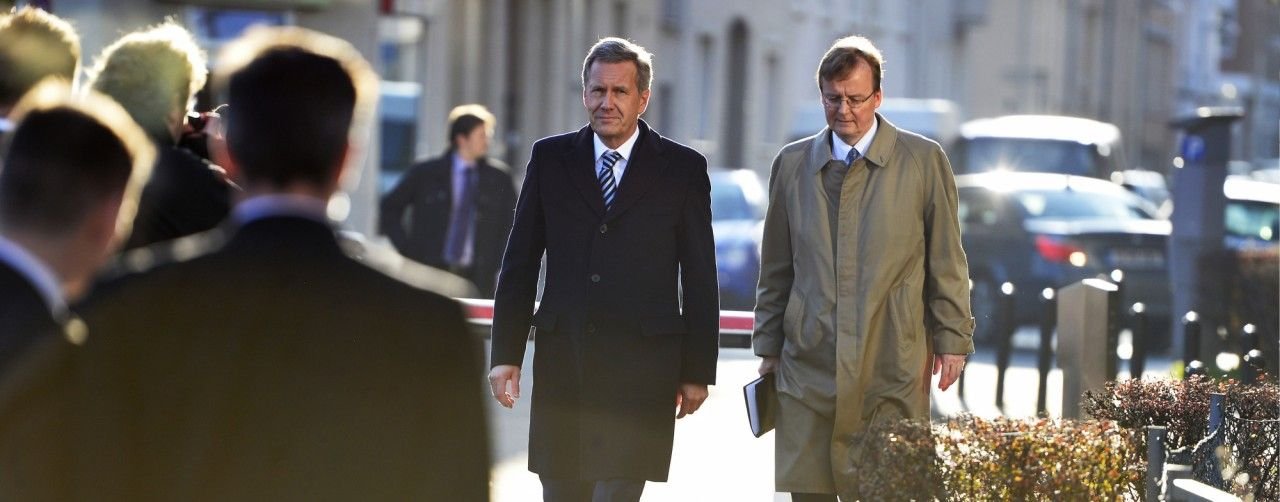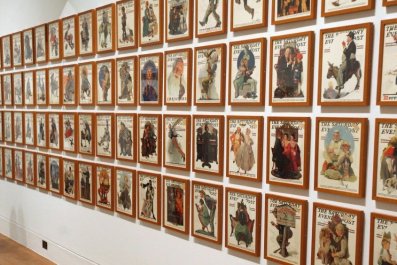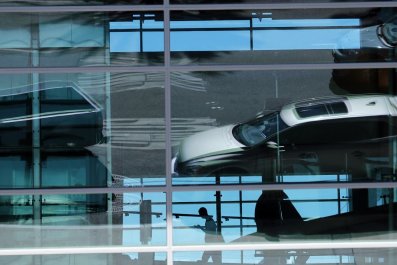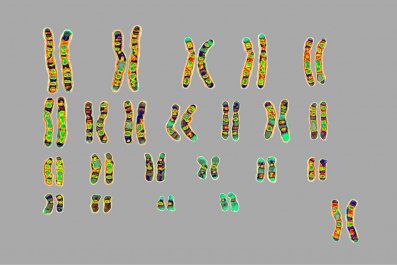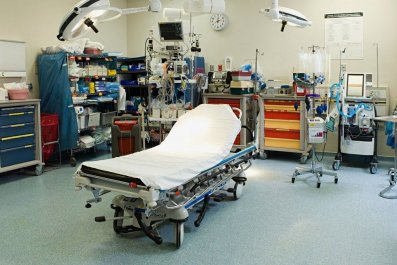In two weeks, Bettina Wulff will testify in the trial of her estranged husband, Christian Wulff, the former president of Germany who stands accused of taking bribes. The hearing is the latest in a long line of embarrassing incidents that casts doubt on whether leaders of the most powerful nation in the European Union are as honest as they claim to be.
Germans think of themselves as upright and impeccably honorable. The general view is that Mediterranean countries are poorly run and mired in scandal while northern European countries play by the rules. The trial of the disgraced Wulff, however, has turned that notion on its head.
For once it seems Germany is operating like a banana republic. "We're sitting on our high horses, telling new democracies they need anticorruption legislation," said Professor Doctor Hans-Joachim Mengel, a professor of political science at the Berlin's Free University, "but we ourselves don't need it, 'because you can trust our politicians.' "
Wulff, 54, stands accused in a court in Hanover of corruption and influence peddling. He was forced out of office last February. As soon as he was in trouble, Bettina, his wife, a blonde former public relations executive 14 years his junior, left him.
Five years ago, as prime minister of Lower Saxony, according to prosecutor Clemens Eimterbäumer, a square-jawed 43-year-old who looks like a young Bruce Willis, Wulff accepted a $1,036 bribe from David Groenewold, a movie producer. Groenewold paid for a hotel stay, a baby-sitter and the entrance fee to the VIP tent at the Munich Oktoberfest.
Subsequently, Wulff wrote to the engineering and electronic giant Siemens asking for financing for a film Groenewold planned to make. This, Eimterbäumer and his team suggest, amounts to corruption.
A president brought low by a gift of just $1,000. Is this just ultra-honest Germany paying pedantic attention to the rules? On the contrary. Though the gift is the only charge Wulff is facing, it's just one aspect of a web of mutually beneficial friendships between the former president and corporate executives.
"The people's reaction to Wulff's trial is, Only 770 euros? That's ridiculous," said Gregor Hackmack, co-founder of the parliamentary watchdog group Abgeordnetenwatch. "Direct bribery like the crime Wulff is accused of is very rare in Germany."
But, he added, "There are different levels of corruption. Many politicians accept gifts from business leaders. They accept dinner invitations from them."
A string of mysterious business dealings led to the scandal that forced Wulff to resign in February last year. There was a Christmas trip to Coral Springs, Fla., which included a stay at the luxurious McMansion of a German scrap-metal multimillionaire, Egon Geerkens.
When Green members of Lower Saxony's state parliament quizzed Wulff about it, he insisted that he and Geerkens had no business dealings. But they did, indirectly. Geerkens's wife had given the Wulffs a $675,000 loan toward a mortgage to buy a home. It was widely suspected the loan really came from Geerkens himself.
The house the Wulffs bought, in the village of Großburgwedel outside Hanover, looks much like any other suburban home, though the taxpayers of Lower Saxony paid for bulletproof windows, steel doors, and a panic room. When Wulff became president, the couple moved to Schloss Bellevue, the magnificent 18th century Berlin palace that has served as the president's official residence since 1994.
Then there was the Nord-Süd-Dialog, a private conference in Hanover, Lower Saxony's capital. Wulff's speaker and his "Siamese twin," as Wulff once called him, Olaf Glaeseker, accepted 17 holiday trips from an event planner, Manfred Schmidt, then used government contacts to arrange sponsors for Schmidt's Nord-Süd-Dialog.
When asked whether the state government was involved in the conference, Wulff's office flatly denied it. Glaeseker claims that Wulff, the patron of the conference, knew about the arrangement with Schmidt. When Glaeseker goes on trial himself on corruption charges in Hanover next month, Wulff will be called as a witness.
After Wulff became president, his business dealings became the focus of intense press attention, not least from the muckraking tabloid Bild, with Wulff insisting he'd done nothing wrong. Wulff told Bild Editor-in-Chief Kai Diekmann not to run a story and allegedly left a threatening message on his voicemail: "There will be a war."
When prosecutor Eimterbäumer demanded that Wulff's presidential immunity from prosecution be lifted, he was left with no choice but to resign.
Wulff's trial, which opened in Hanover on November 14, isn't just the gripping story of a fallen political star caught with his hand in the till. It has also brought unparalleled attention to the perennial cozy relationship between German politicians and the business sector.
Siegfried Kauder, a Christian Democratic Union member of the Bundestag until this year, described how businessmen tend to "create a comfortable atmosphere for the politicians they're interested in. They invite you to concerts and good restaurants. It happens not just in [German] federal politics, but in the European Parliament, the state parliaments, and at the local level as well."
One way companies ensure legislators are sympathetic is to offer highly paid speaking gigs. Since the 2009 election, parliamentarian Peer Steinbrück, the Social Democratic Party candidate for chancellor in the elections this September, has earned at least $950,000, in addition to his Bundestag salary of $133,680, mostly by giving speeches.
Nine other Bundestag members have earned over $200,000 through extracurricular work. "Of course, in reality the speech payments are for completely different services," said Hackmack.
Dr. Günter Krings, deputy leader of the Christian Democratic Union/Christian Social Union faction in the Bundestag, disagrees. "I've never experienced corruption among members of the Bundestag," he said. "Of course, some members are close to the private sector, but that has not yet amounted to cases of bribery."
But in Germany, a country that prides itself on doing things by the book, the thought of politicians being less than honorable is worrisome. "We Germans always tend to think that here in Germany everything is always done correctly," said Konstantin von Notz, a lawyer and Green Party MP. "What we have is mostly not pure corruption, but it's still not okay and that makes it problematic."
The intimacy between politicians and business interests affects both parties. There is a revolving door between politicians and the businesses they once regulated. As the chancellor, Social Democratic Gerhard Schröder vigorously supported the construction of a North Sea pipeline from Russia to Germany.
Immediately after losing the 2005 election, he joined Nord Stream AG, the Russian-German company building and operating the pipeline. Today he's chairman of the company's Shareholder Committee.
And this year, Eckart von Klaeden, a CDU member of the Bundestag and state secretary to Chancellor Angela Merkel, resigned to become chief lobbyist for the carmaker Daimler. Even so, he remained a member of the CDU's governing board.
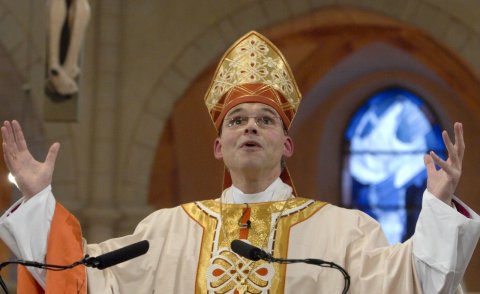
Meanwhile, Bishop Franz-Peter Tebartz-van Elst of Limburg added to growing public disaffection with Germany's leaders by spending $42 million of church money lavishly renovating his official residence, which included a $20,000 bathtub. The bishop lied about expenses, too, traveling first class on a flight to India, then claiming under oath he had sat in business class.
Tebartz-van Elst also faced a trial, for lying under oath, a charge he recently settled by paying a fine of $27,000. Von Eckert, for his part, has bowed to pressure from party colleagues and resigned from the CDU board, but remains under investigation.
Pope Francis swiftly suspended Tebartz-van Elst, but German leaders have no means of dealing with their unethical colleagues. "For elected politicians, buying votes and carrying out political acts as a result of receiving gifts are the only things explicitly prohibited by law, and that's something that can almost never be proven," explained Michael Koss, chair of the political team at Transparency International's German branch. "Members of the executive are subject to closer regulation." That's why Wulff and Glaeseker are on trial.
Only one German lawmaker has ever been prosecuted for corruption. Indeed, Germany is one of a handful U.N. member states that hasn't ratified the U.N.'s anticorruption convention. Even so, since stringent laws apply to public-sector workers - they may not accept gifts worth more than $37.50 - most Germans have never encountered corruption.
But the wind is changing. For instance, prosecutors are also investigating whether von Klaeden used his position as a participant in car industry discussions at the chancellery to Daimler's advantage.
"The prosecutors have become braver and now have the confidence to launch investigations of politicians, even though they know that the government can shut down their investigations or move them to different jobs," explains Hackmack.
"In the past, the attitude was always, Here in Germany we do everything correctly, why would we need to investigate corruption?
"The exciting thing right now is that the prosecutor is daring to put Wulff on trial even though the case concerns a pretty small sum."
The case against Wulff will dominate the headlines when his wife testifies on December 12. He met her in 2006 and they married two years later. As first lady, Bettina was widely disliked. She was seen as a schemer who wanted to become Germany's Hillary Clinton. She gained further notoriety when she sued Google over its auto-complete function, which automatically added escort and prostitute to her name whenever anyone searched for her. Google agreed to remove eight of the 3,000 search results she demanded be deleted.
Recently she published her memoirs, a cringe-inducing volume in which she muses over such weighty topics as having sex when bodyguards are posted outside the door.
By the standards of Western Europe and North America, German politics is remarkably clean: Heads of government don't own major media outlets; top campaign donors are not rewarded with plum ambassadorships; parliamentarians don't engage in mass cheating on their expenses. Indeed, Transparency International ranks Germany 13th in its latest Corruption Perceptions Index, above the U.K., the U.S., France, and Italy.
Still, amid the recent scandals, there's a growing recognition that Germany needs stricter anticorruption laws. Thomas Kutschaty, justice minister of North Rhine-Westphalia, has spent years campaigning for such legislation. "The amount of resistance I got in the beginning was pretty intense," he recalls. "But as time has gone on, I've received more support. Now I'm even convinced that the new coalition government will take on this issue."
On November 27, the CDU/CSU and the SPD announced they had succeeded in striking a deal to form a new government. With a combined strength of 504 MPs, the new administration will have an overwhelming majority in the 631-member Bundestag.
"In the intersection between politics and business, not everybody is an angel," said Mengel. "We need proper anticorruption laws for the same reason that we have laws banning murder: most people would never consider killing anybody, but you need to formalize the fact that it's not allowed."
"All the parliamentary groups in the Bundestag would like to pass stricter anticorruption laws, but it's very hard to define where to draw the line of what's allowed and not allowed. Some people refuse to even accept a cup of coffee," said Krings.
Among ideas promoted by parliamentary groups is a three-year cooling-off period between a politician leaving office and taking up a position covering the same area in the private sector.
Wulff rejected a plea bargain offered by Eimterbäumer because he wants his name cleared. If convicted, he faces up to three years in jail. But a guilty verdict is far from certain and Hackmack notes, "If Wulff is declared innocent, people will say, 'Not even this case was real corruption. We don't need to do anything.' "
Whatever the outcome, German politicians will start paying closer attention to who is inviting them to dinner or an overnight stay. They could end up losing the roof over their heads.
Wulff no longer lives in the house he bought with the dubious loan that set the whole scandal in motion. When he and Bettina separated earlier this year, he moved into a modest apartment.



